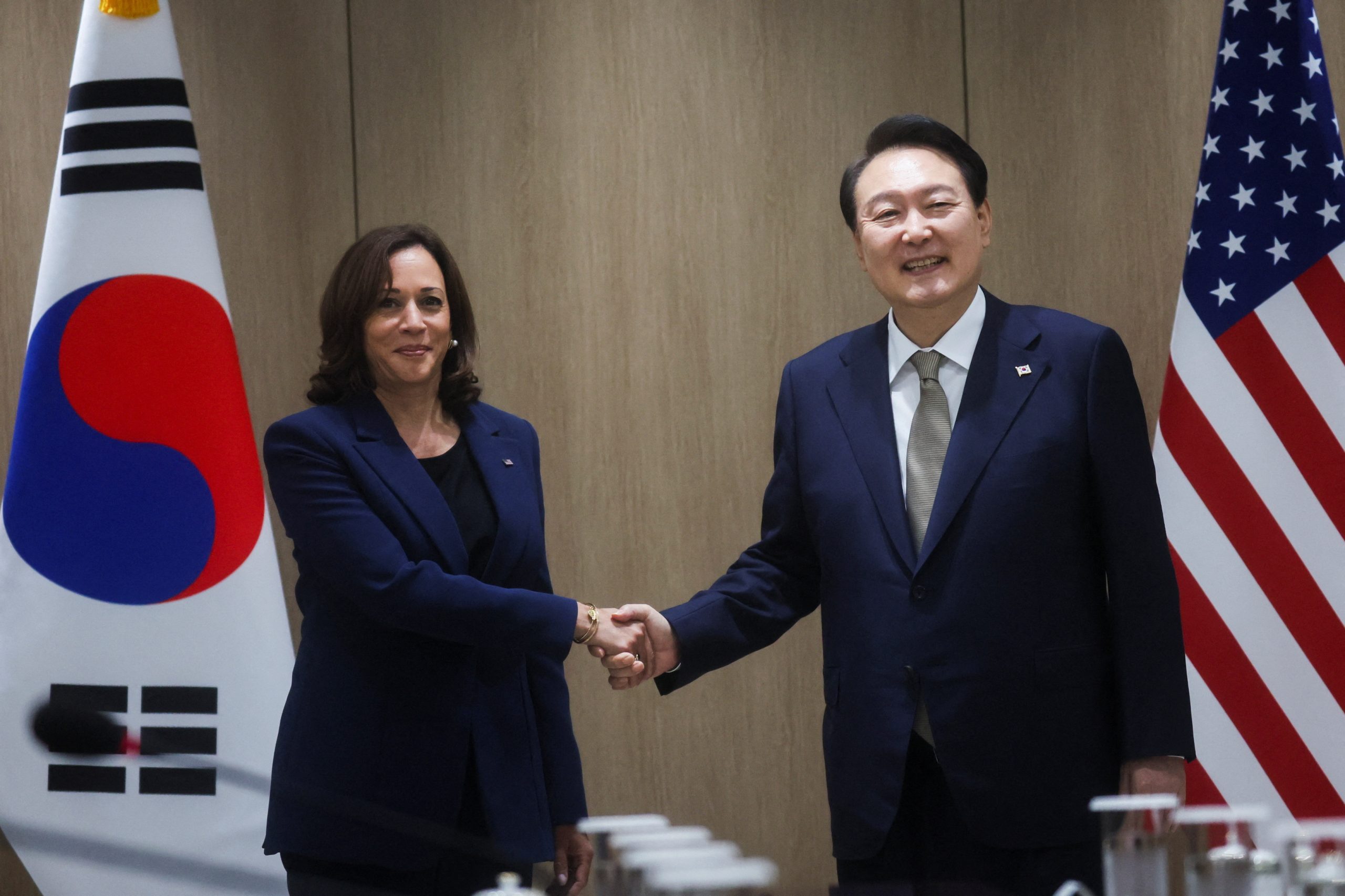
Willie R. Tubbs, FISM News
[elfsight_social_share_buttons id=”1″]
The Democratic People’s Republic of Korea, more accurately the communist dictatorship of North Korea, played its one foreign policy card multiple times in the days leading to U.S. Vice President Kamala Harris’ visit to South Korea and Taiwan and the arrival of a U.S. warship for joint exercises. The N. Korean military fired test ballistic missiles in a targeted display of strength over the last week, but their attempts to deter or intimidate the United States military or Harris have failed.
Wednesday, in a reminder to the world that the United States does not require or request the blessing of Kim Jong-un, Vice President Harris visited a U.S. warship on her way to the South Korean demilitarized zone just hours after North Korea fired a missile, it said, as part of a nuclear weapon development program.
North Korea’s decision to fire two ballistic missiles only days apart received a rebuke from Harris but did not alter her travel itinerary. She further indicated the acts had zero effect on the nation’s plans going forward.
“The United States believes that peace and stability in the Taiwan Strait is an essential feature of a free and open Indo-Pacific,” Harris told sailors aboard the USS Howard. “And we will continue to fly, sail, and operate undaunted and unafraid wherever and whenever international law allows.”
While Harris was remarkably steadfast in her commitment to S. Korea in the face of N. Korean aggressions, the Vice President made an unfortunate gaffe where she mistakenly switched the names of the two countries.
The United States shares a very important relationship, with is an alliance with the Republic of North Korea,” Harris blundered.
Kamala Harris goes gaffe for gaffe with Biden.
"The United States shares a very important relationship which is an alliance with the republic of North Korea." pic.twitter.com/8LInnss4nA
— Daily Caller (@DailyCaller) September 29, 2022
Other than the blunder, Harris reaffirmed that the U.S. would do everything in its power to protect S. Korea.
“I cannot state enough that the commitment of the United States to the defense of the Republic of Korea is iron-clad,” Harris added, “and that we will do everything in our power to ensure that it has meaning in every way that the words suggest,”
Harris’ words paired well with those of Senators Marco Rubio (R-Fla.) and Bill Haggerty (R-Tenn.), who on Tuesday urged Secretary of State Antony Blinken and Secretary of the Treasury Janet Yellen to enforce mandatory sanctions on North Korea.
In the case of Haggerty and Rubio, both members of the Senate Foreign Relations Committee, the request centered on North Korea’s support of Russian President Vladimir Putin and the North Korean government’s practice of sending its citizens around the world to work only to seize upward of 90% of those workers’ salaries.
“As you are well aware, mandatory sanctions require the President to designate any person who: (1) knowingly, directly or indirectly, engages in, facilitates, or is responsible for the employment of North Korean workers; and (2) knowingly, directly or indirectly, imports, exports, or reexports to, into, or from North Korea any arms or related materiel,” the senators wrote. “We urge you to impose sanctions on any company, individual, or financial institution that is involved in hiring North Korean forced laborers – including IT workers and workers in the Russian-occupied regions of Ukraine – and is involved in the transfer of military items from North Korea to Russia.”
Haggerty and Rubio also warned that American tech companies could be aiding North Korea in its efforts.
“We urge you to review the practices of websites, including LinkedIn and Indeed, which continue to host fraudulent user profiles of North Korean IT workers, to determine if there are sufficient safeguards in place to prevent American companies from employing North Korean forced laborers through these websites.”
It was lost on no one that whatever tensions the United States has with North Korea is indelibly linked to China.
Harris, whose visit to the Indo-Pacific is the latest show of commitment from the U.S. to its allies in the region – chief among them South Korea, Australia, Japan, and Taiwan – as the West contends with the growing threat of Chinese expansion and “disturbing” acts from China against Taiwan and at sea.
“The United States is a proud Pacific power,” Harris said. “The American people have a profound stake in the future of this region. And we will continue to promote an Indo-Pacific that is free and open, connected, secure, and resilient.”
Harris’ tour of the region has included stops in Japan and Australia. She has been criticized by some on the right for the optics of visiting the S. Korean border while ignoring the southern border that she was put in charge of securing.
